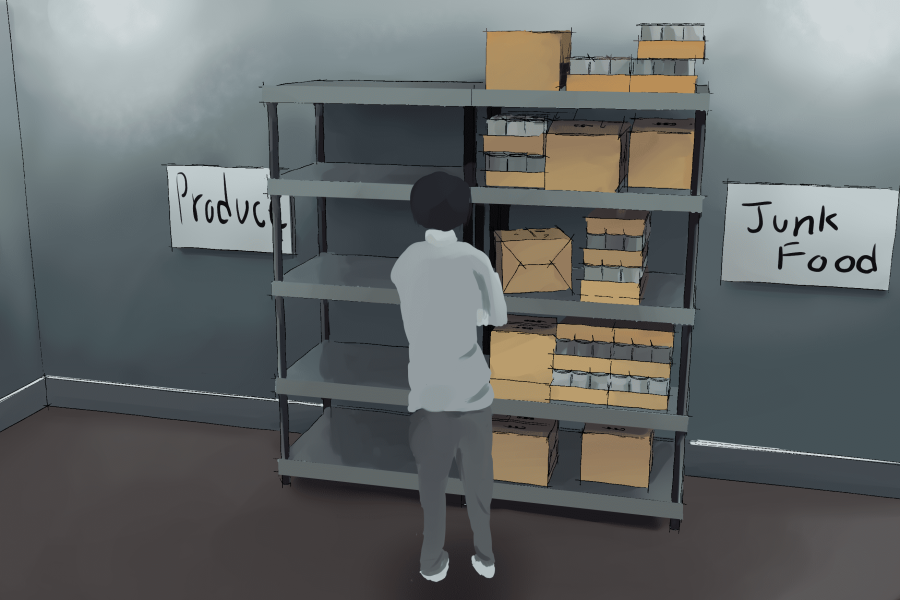Everyone has seen some joke on social media depicting ‘college student struggles,’ and many of these jokes revolve around students’ inability to acquire nutritious food. However, these jokes underline the important issue of food insecurity that is found across all college campuses in the United States. Each UC campus is doing what it can to help combat this issue, but when compared to other UC campuses, UC San Diego is falling behind in solving the problem of food insecurity. This is due to an inefficient allocation of funds, which is inhibiting the on-campus Basic Needs Hub from securing a more varied array of food resources, instituting a larger building to host these resources, and having regular and consistent hours.
UCSD Basic Needs Report estimates that one in four students have “somewhat to very often” skipped meals to save money, and four in 10 UC students have “very little” access to high quality nutritious food. This topic has recently come to light in 2015 with UC President Janet Napolitano launching the Global Food Initiative and disbursing a $151,000 grant to every UC campus. With this increased funding to combat food insecurity, many UC campuses have already utilized these funds to combat the widespread problem. However, while each campus has already broken ground in this problem, it seems that one campus in particular is leading the pack and becoming the pioneer in minimizing food insecurity. Unfortunately, it is not UCSD.
On Oct. 2 of this year, UC Irvine launched a 2,318-square-foot FRESH Basic Needs Hub offering a fully stocked pantry with dried and canned goods, large baskets of fresh fruits and vegetables, refrigerated items, and emergency toiletries. The pantry is the largest, most comprehensive food pantry in the UC system and is open to all students for regular business hours days. In addition to the pantry, multiple programs are available to every student such as the Emergency Meal Swipes Program; applicants who qualify for this program receive 10 free meal swipes per quarter from the UCI dining services.
UCSD also has a Basic Needs Hub and a food pantry open to all students, but they operate on a much smaller scale. The Triton Food Pantry is located in the Old Student Center and can be described with one word: cramped. The actual size of the space cannot be more than 500 square feet. While the actual Basic Needs Hub is slightly larger, it is currently under construction and is rarely accessible. The hours of the food pantry are also sporadic since it is not open the same time each day. In addition, the majority of the Triton Food Pantry’s food products are processed items, and while this allows for a longer shelf-life, the food lacks the type of nutrition that fresh produce and other varied non-perishable items can provide.
The total budget of the UCSD Basic Needs Hub is $127,828.03 and its expenditures cost $100,066.59, with a surplus of $27,761.44. With such a large surplus, the Hub could strategically use it to secure a larger space to host the Triton Food Pantry, invest in more sustainable produce, and hire more managers to extend its hours. As of now, the Hub is somewhat fixing the on-campus food insecurity issue by providing free food, but it is only acknowledging half of the problem.The food supplied by the Triton Food Pantry does not always equate to a nutritious healthy meal, due to the fact that most of their products are non-perishable items. This is hardly a nourishing meal for students that rely on a healthy mind and body to accomplish day-to-day tasks. Therefore, the Hub should utilize the budget it was allotted to purchase more sustainable and variable foods such as vegetables and fruits instead of investing in foods with longer shelf lives. Only then would UCSD be able to fulfill its status as conquering food insecurity like UCI has. Until then, many students will be substituting dry produce for nutritious meals, which do not retain any sort of valuable nutritional value except extreme salt content.
As the cost of living prices continue to rise, more students will continue to struggle in finding the financial resources to meet their basic needs. With universities continuing to accept our tuition payments, it is their responsibility to ensure the security and prosperity of every single student attending that school.








Nancy • Nov 28, 2017 at 9:30 pm
http://www.basicneeds.uci.edu/about-us/our-story.php
I absolutely agree that UCSD is behind UCI (and perhaps other UCs ) in tackling food insecurity through a Basic Needs Hub! However, there is some inaccuracy in this article..
“On Oct. 2 of this year, UC Irvine launched..”
UCI had originally “launched” their Basic Needs Hub in October 2015. They encountered issues such as (and as you have noted): size of the pantry, location, and lack of fresh produce! They were able to expand in both size of the place amongst other things due to “increased funding”. (All of this information is from the link above!)
On the same note, I’d love to see UCSD’s Basic Needs Hub expand and become a resource for students on and off-campus! Thank you for writing on this important issue. Let’s continue to support these resources 🙂
Mickey • Nov 30, 2017 at 9:51 pm
Why they haven’t started more campus edible gardens is absurd to me! Every event uses their food funds on fast-food junk from corporate businesses. They should be using local shops to support the greater community and using garden grown produce in everything.